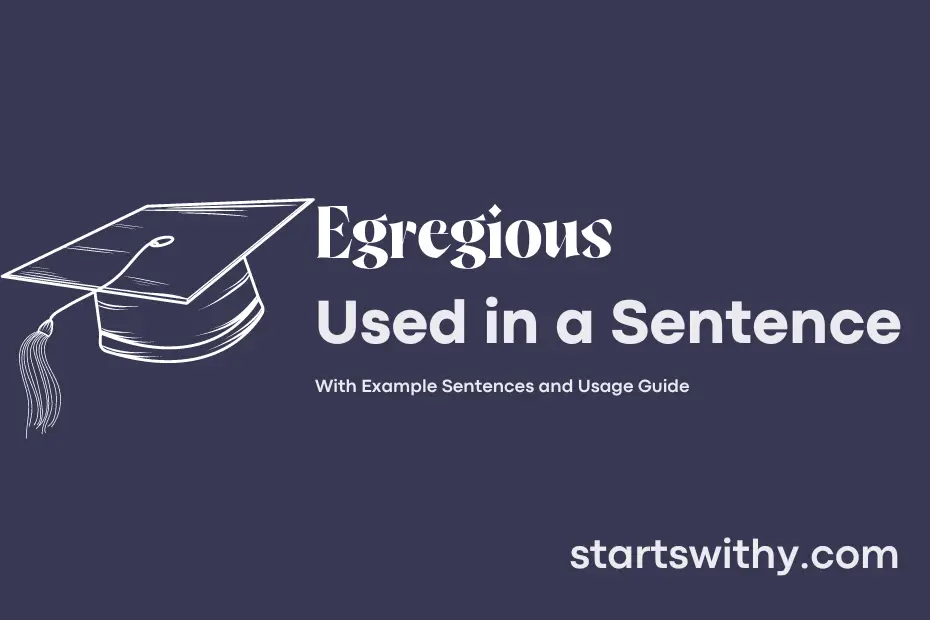Ever been in a situation where someone’s behavior was so shockingly bad that it couldn’t be ignored? That’s what we call an “egregious” action. Egregious refers to something extremely offensive, shocking, or outstandingly bad.
In the realm of communication, an example sentence with the word “egregious” could help illustrate the severity of a situation or emphasize just how unacceptable a behavior or mistake is. Let’s explore how this powerful term can be employed to amplify the impact of our words and express strong disapproval or criticism.
7 Examples Of Egregious Used In a Sentence For Kids
- Egregious means very very bad.
- Do not make an egregious mistake.
- It is not good to be egregious.
- Let’s try to avoid doing something egregious.
- We should always be kind and not do anything egregious.
- A big and egregious mistake is not good.
- It is important to learn from any egregious errors.
14 Sentences with Egregious Examples
- Egregious mistakes in referencing can lead to plagiarism accusations, so make sure to double-check your sources.
- It is considered egregious to copy someone else’s work without giving proper credit, always ensure you cite your sources correctly.
- Submitting an essay full of spelling errors would be an egregious oversight at this level of education.
- It would be quite egregious to skip an important lecture just to hang out with friends.
- Failing to submit your project on time would be seen as an egregious mistake and might affect your grades.
- It is important to avoid making egregious errors in your calculations during exams.
- Plagiarizing someone else’s work is an egregious offense that can have serious consequences.
- Egregious behavior, such as cheating during exams, is not tolerated in academic settings.
- Skipping classes regularly would be considered egregious by most professors.
- Not following the proper format for your research paper is viewed as an egregious mistake by your academic advisor.
- Asking someone else to write your assignments for you is an egregious breach of academic integrity.
- It would be utterly egregious to ignore the feedback provided by your professors on your assignments.
- It is crucial to recognize and rectify any egregious mistakes in your thesis before submission.
- Turning in a group project without contributing your fair share of work would be considered quite egregious by your peers.
How To Use Egregious in Sentences?
To Egregious means to be outstandingly bad or shocking in a specific context. When using the word Egregious in a sentence, it is important to ensure that it accurately conveys the severity or extremity of the situation being described.
Here is a simple guide on how to use Egregious in a sentence:
-
Identify a situation where something is exceptionally bad, shocking, or outstandingly wrong.
Example: “The company’s egregious disregard for safety regulations led to a tragic accident.”
-
Place the word Egregious in the sentence where it accurately describes the extent of the wrongdoing or the severity of the situation.
Example: “The team’s performance was egregious, with multiple errors costing them the game.”
-
Ensure that the context in which you are using Egregious is appropriate and effectively conveys the severity of the situation.
Example: “His egregious behavior at the meeting left everyone speechless.”
By following these simple steps, you can effectively incorporate the word Egregious into your sentences to express extreme disapproval or shock about a particular action or situation. Just remember to use it in the right context to convey the severity of the wrongdoing.
Conclusion
In conclusion, the examples of sentences with the keyword “egregious” illustrate various instances where actions or behaviors are exceptionally or shockingly bad. These sentences highlight instances of grave misconduct or offenses that stand out for their notably severe nature. “Egregious” serves as a strong descriptor to convey the severity of certain behaviors or actions that are considered extremely offensive or shocking.
By identifying and understanding sentences with “egregious,” individuals can better grasp the gravity of certain situations or behaviors that warrant significant attention or concern. This term emphasizes the seriousness of actions that exceed standard levels of wrongdoing, making it a critical indicator of deeply problematic or unacceptable conduct.



